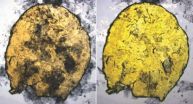No need for water, enzymes are doing it for themselves
2014-10-06
(Press-News.org) New research by scientists at the University of Bristol has challenged one of the key axioms in biology - that enzymes need water to function. The breakthrough could eventually lead to the development of new industrial catalysts for processing biodiesel.
Enzymes are large biological molecules that catalyse thousands of different chemical reactions that are essential for all life, from converting food into energy, to controlling how our cells replicate DNA.
Throughout this diverse range of biological environments in which enzymes perform their various roles, the only constant is an abundance of water.
However, new findings published today [6 October] in Nature Communications, show that water is not essential for enzymes to fulfil their biological role.
This discovery could pave the way for the development of new thermally robust industrial enzymes that could be utilised in harsh processing conditions, with applications ranging from detergent technologies to alternative energies via biofuel production.
Dr Adam Perriman and colleagues were able to circumvent the need for water by decorating the surface of the industrial enzyme lipase with long detergent molecules.
In principle, what the team created was an enzyme with an in-built ability to exist as a liquid without any solvent. What was astounding was that the solid chemical reactant, also known as the substrate, could be dissolved directly by the liquid enzyme, which then went on to catalyse the chemical reaction, and would continue to do so up to temperatures as high as 150° C.
Dr Perriman, from Bristol University's School of Cellular and Molecular Medicine, said: "From our preliminary experiments, we knew that the molecular structure of the lipase was still intact after the modifications, even at 150° C.
"However, we were surprised and delighted to discover that the catalytic activity of the enzyme was still present. The ability to rationally design a self-contained reactive biofluid, where one can literally sprinkle a solid substrate onto it, and then observe a chemical reaction, represents a real fundamental scientific advance."
INFORMATION:
'Enzyme activity in liquid lipase melts as a step towards solvent-free biology at 150°C' by Alex Brogan, Kamendra Sharma, Adam Perriman and Stephen Mann in Nature Communications.
[Attachments] See images for this press release:

ELSE PRESS RELEASES FROM THIS DATE:
2014-10-06
Plants that come under attack from pathogens have an automatic immune response. Fungi get around this plant immunity by injecting proteins into the host plant cells. These 'effector proteins' enable the fungi to escape the plant's immune system and allow the fungal cells to enter the plant unrecognised.
Exeter scientists have now shown that signalling organelles, known as 'early endosomes' act as long distance messengers in the fungi. They travel rapidly along long tube-like cells between the plant-invading fungal cell tip and the fungal cell nucleus. This rapid communication ...
2014-10-06
PITTSBURGH—One way to combat the rising level of errors and fraud in life sciences research is through massive online laboratories, which use videogames to engage large numbers of non-professional investigators and prevent scientists from manually testing their own hypotheses, researchers from Carnegie Mellon University and Stanford University say.
Though unconventional, CMU's Adrien Treuille and Stanford's Rhiju Das argue that this online, game-like approach actually is more scientifically rigorous than the standard practice of scientists proposing an explanation for ...
2014-10-06
This news release is available in Spanish. [Gondar, Ethiopia and Geneva, Switzerland – October 6, 2014] - The international research & development (R&D) consortium, AfriCoLeish, formed by six research organizations from East Africa and Europe, has launched a Phase III clinical study to address the extreme difficulty in treating visceral leishmaniasis (VL) in patients who also are HIV-positive. The study will assess the efficacy and the safety of two treatments: a combination treatment of AmBisome® and miltefosine, and AmBisome® alone. This is the first randomized clinical ...
2014-10-06
New research confirms that sleep disturbances are linked to pain and depression, but not disability, among patients with osteoarthritis (OA). Study results published in Arthritis Care & Research, a journal of the American College of Rheumatology (ACR), found that poor sleep increases depression and disability, but does not worsen pain over time.
Arthritis is one of the top three health concerns that cause disability in the U.S., with OA being the most common form of arthritis. Medical evidence reports that nearly 30 million Americans are affected by OA, which has increased ...
2014-10-06
PROVIDENCE, R.I. [Brown University] — Within our fat lives a variety of cells with the potential to become bone, cartilage, or more fat if properly prompted. This makes adipose tissue, in theory, a readily available reservoir for regenerative therapies such as bone healing if doctors can get enough of those cells and compel them to produce bone.
In a new study in the journal Stem Cell Research & Therapy, scientists at Brown University demonstrate a new method for extracting a wide variety of potential bone-producing cells from human fat. They developed a fluorescent tag ...
2014-10-06
An innovative patient management system at the acute stroke unit of Kelowna (BC) General Hospital has reduced the number of stroke patient bed days by more than 25 per cent, according to a study of the system presented at the annual Canadian Stroke Congress in Vancouver.
In total, it is estimated the new system is saving the 380-bed hospital more than 1,000 bed days per year. This represents annual savings of up to $800,000, all achieved without the need for any new investment in devices, treatments or personnel.
"It's a win-win situation," says Dr. John B. Falconer, ...
2014-10-06
At the first sign of a stroke, time is of the essence. For every minute of delay in treatment, people typically lose almost two million brain cells. Yet a new study presented at the Canadian Stroke Congress reveals that those delays – in getting the right tests and the right drugs – can be longer when people experience a stroke in a hospital.
Investigators from the University of Toronto Faculty of Medicine, the Institute for Clinical Evaluative Sciences (ICES) and the University Health Network looked at data from acute care facilities in Ontario over nine years. They ...
2014-10-06
Researchers at the University of Texas Medical Branch at Galveston say that sexting may be the new "normal" part of adolescent sexual development and is not strictly limited to at-risk teens. The findings, published in the journal Pediatrics, are from the first study on the relationship between teenage sexting, or sending sexually explicit images to another electronically, and future sexual activity.
The study results indicate that sexting may precede sexual intercourse in some cases and further cements the idea that sexting behavior is a credible sign of teenage sexual ...
2014-10-06
We might love to reminisce and tell others about our extraordinary experiences — that time we climbed Mt. Kilimanjaro, got to taste a rare wine, or ran into a celebrity on the street — but new research suggests that sharing these extraordinary experiences may come at a social cost. The findings are published in Psychological Science, a journal of the Association for Psychological Science.
"Extraordinary experiences are pleasurable in the moment but can leave us socially worse off in the long run," says psychological scientist and study author Gus Cooney of Harvard University. ...
2014-10-06
Children's future writing difficulties can be identified before they even learn how to begin writing, according to a new study by Professor Phaedra Royle and Postdoctoral fellow Alexandra Marquis of the University of Montreal's School of Speech Language Pathology and Audiology. The researchers are interested in oral language skills and their impact on grammar and spelling learning. Their work shows that oral language is a good predictor of writing difficulties. "The more children are able to use verb tense in spoken language, the more easily they can learn written language," ...
LAST 30 PRESS RELEASES:
[Press-News.org] No need for water, enzymes are doing it for themselves




